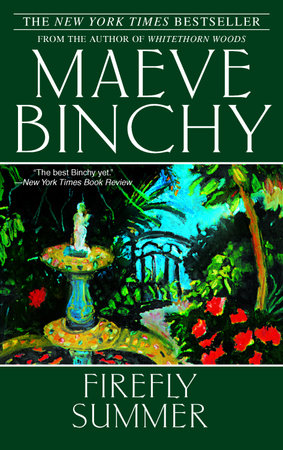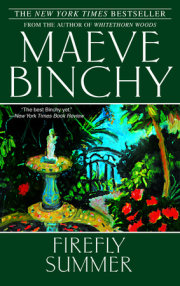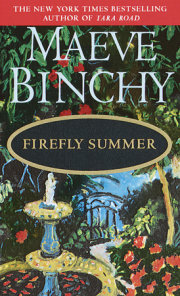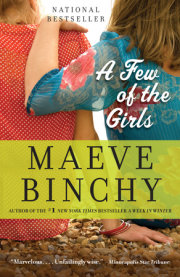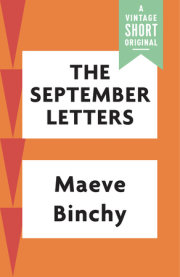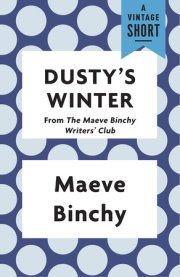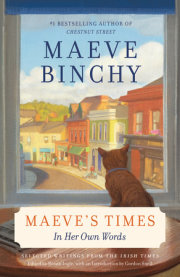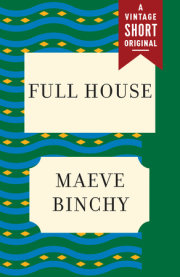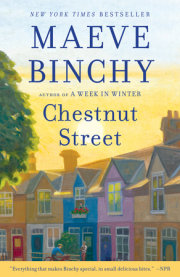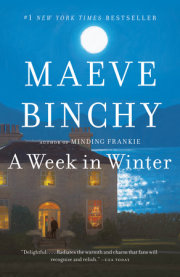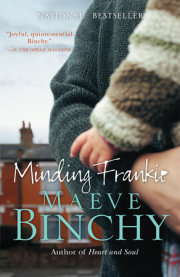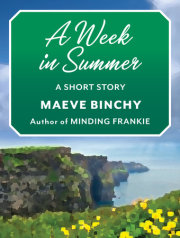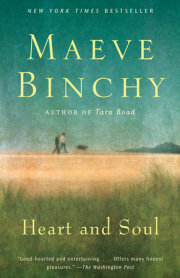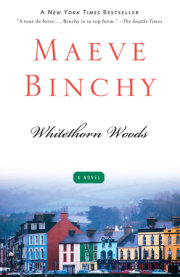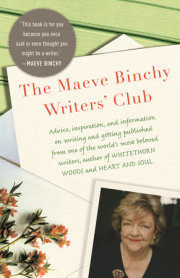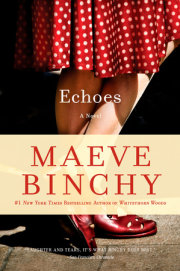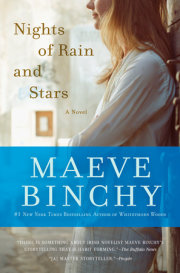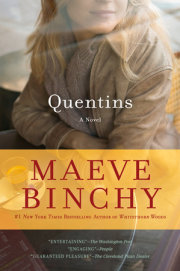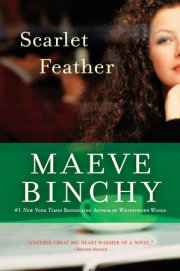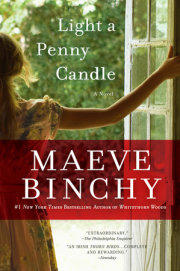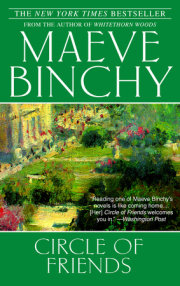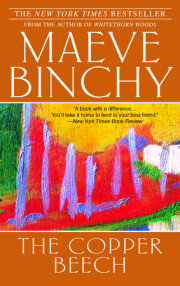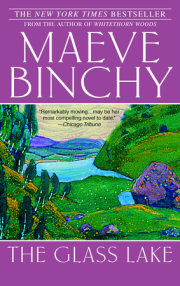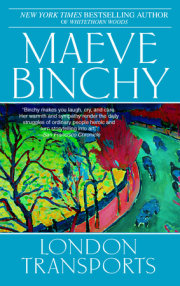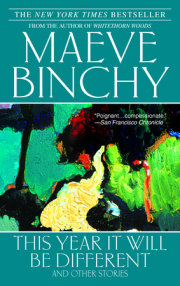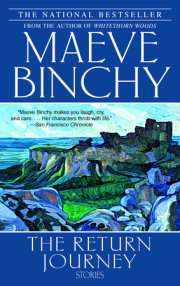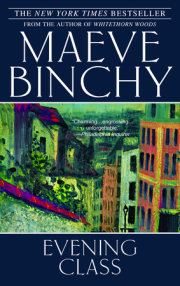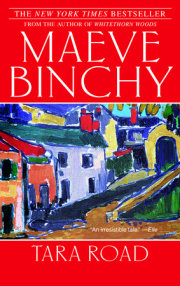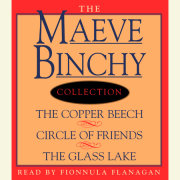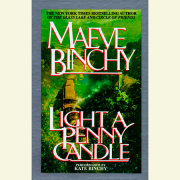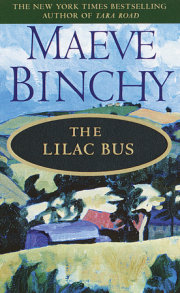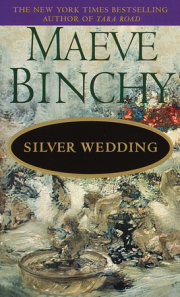The sun came in at a slant and hit all the rings and marks on the bar counter. Kate Ryan managed to take a cloth to them at the same time as she was kicking off her house shoes and pulling on her wellington boots. She tucked her handbag under the counter and in almost the same movement opened the kitchen door to make sure that Eddie and Declan weren't torturing the new girl. The new girl had red eyes and a sad face and was missing her farm home. She might run back to it if Eddie and Declan were at their worst. But mercifully the appeal of the tortoise was still very strong even after three weeks. They lay on their stomachs and fed it stalks of cabbage, screaming with delight when it accepted them.
"John," she shouted, "will you come down to the bar, I have to go across the river and see what's keeping the twins. They have to be polished and smartened up for the concert and there isn't a sign of them."
John Ryan groaned. His train of thought was gone again. He had thought he would manage an hour or two on his own, struggling with his poetry. "Give me a minute," he called, hoping to catch the idea before it was gone.
"No, they'll be late as it is. Listen, bring your paper and pencil down, there's likely to be no one in, but there has to be someone behind the counter."
The door banged behind her and John Ryan saw, through the bedroom window, his wife run across the small footbridge opposite the pub. She climbed over the gate like a girl instead of a woman in her thirties. She looked altogether like a girl in her summer dress and her boots as she ran lightly across to the ruined house, Fernscourt, to find the twins.
He sighed and went down to the pub. He knew there were poet publicans, he knew there were men who wrote the poetry of angels in the middle of the stinking trenches of war. But he wasn't like that.
John Ryan moved slowly, a big man with a beer belly that had grown on him sneakily during the years standing behind a bar, jowls that had become flabby at the same trade. His wedding picture showed a different person, a thinner more eager-looking figure, yet the boyish looks hadn't completely gone. He had a head of sandy brown hair only flecked with grey and big eyebrows that never managed to look ferocious even when he willed them to, like at closing time or when he was trying to deal with some outrage that the children were reported to have committed.
Kate had hardly changed at all since their wedding day, he often said, which pleased her, but she said it was just a bit of old softsoaping to get out of having to stand at the bar. It was true, though; he looked at the girl with the long, curly dark hair tied back in a cream ribbon that matched her cream dress and coat. She looked very smart on that wet day in Dublin, he could hardly believe she was going to come and live with him in Mountfern. Kate hadn't developed a pot belly from serving drinks to others, as she often told him sharply. She said that there was no law saying you must have a drink with everyone who offered you one or pull a half pint for yourself to correspond with every half-dozen pints you pulled for others.
But then it was different for women.
John was the youngest of the seven Ryan children and the indulged pet of a mother who had been amazed and delighted at his arrival when she had been sure that her family was complete. He had been overfed and given fizzy drinks with sweet cake as long as he could remember. As a lad the running and leaping and cycling miles to a dance had kept him trimmer. Now, between sessions of writing his poetry and serving in his bar, it was a sedentary life.
He didn't know if he wanted it for his sons; he had such hopes for them--that they might see the world a bit, study maybe and go on for the university. That had been beyond the dreams of his parents' generation. Their main concern had been to see their children well settled into emigration; the church had helped of course, educating two nuns and two priests out of the Ryan family. John didn't see any vocation among his own offspring. Michael was dreamy and thoughtful: maybe a hermit? Or Dara a resourceful Reverend Mother somewhere? Eddie was a practical child, possibly a missionary brother teaching pagan tribes to build huts and dig canals. Declan the baby. Maybe they could make a curate out of him near home where they could keep an eye on him.
This was all nonsense, of course. None of them would end up within an ass's roar of a religious life. Still, John Ryan never saw the future standing surrounded by three sons and possibly his daughter all in the trade.
There would never be enough business, for one thing. Like many Irish towns Mountfern had the appearance of having far too many pubs already. If you went down the main street, Bridge Street, there were no less than three public houses. Foley's at the top of the town, but that was hardly a pub at all these days, just a counter really and a few friends of old Matt Foley drinking at night, they'd hardly know how to serve a real customer. Then there was Conway's which was more a grocery but it had the bar at the back. Conway's had a clientele of secret drinkers, people who didn't admit to any kind of drinking, who were always going out for a packet of cornflakes or a pound of flour and would toss back a brandy for their health. Often too, it had a funeral business since old Barry Conway was the undertaker as well. It seemed only right to come back to his place to drink when someone had been buried up on the hill. And Dunne's was always on the verge of closing. Paddy Dunne never knew whether to reorder supplies; he always said that it would hardly be worth it since any day now he'd be going to join his brother who ran a pub in Liverpool. But then either there would be a downturn in the fortunes of the Liverpool pub or an upswing in the drinking patterns of Mountfern. There was an unsettled air about his place and constant speculation about how much he would get if he were to sell his license.
John Ryan's pub had its rivals then, three of them in a small place like Mountfern. Yet he had all the business that came from the River Road side of the place. He had the farmers on this side of the town. It was a bigger and better bar than any of the other three, it had not only more space but it had more stock. And there were many who liked the walk out along the river bank.
John Ryan knew that he was a man who had been given a great deal by fate. Nobody had gathered
him up to swoop him off to a religious order when he was a young impressionable boy. Neither had he been sponsored out to a life of hard graft in America like two of his elder brothers. By all their standards he had a life of ease and peace where he should well have been able to run his business and write his poetry.
But he was a man who did one thing at a time, almost overmethodically, too predictable sometimes for his wife who felt that people should be able to fire on several cylinders at the same time.
John wanted time to write or time to serve drink, he couldn't switch from one mode to another like lightning. Like Kate. He couldn't switch toward the children like she could as well. Either they were good or they weren't. He wasn't able to see the swift changes of mood like Kate was. He would not be cross and then smile minutes later. If he was cross he was very cross indeed. It was rare but it was all-embracing when it happened. One of Daddy's great angers was remembered long, whereas Mammy had a dozen quick and easily forgotten angers in a week.
John sighed again at his wife's swiftness and the annoyance at having to leave his work, his real work, just at that time. He knew that in this pub fate had handed him something that many a man in Ireland would envy mightily. It didn't bring in enough money for them to employ another pair of hands, but it wasn't so slack that a man could sit at the counter and write undisturbed. John Ryan hadn't brought his paper and pencils with him, any more than his thoughts. If customers saw you with paper and pencil they thought you were doing the accounts and making a small fortune. Anyway, what would have been the point? There was Jack Coyne from the garage who had just sold a heap of rusty metal to some unsuspecting farmer and they were in to seal the bargain with a pint.
Jack Coyne had a face like a ferret and two sharp eyes looking around him for a bargain or a business deal. He was a small wiry man equally at home underneath a car, covered in grease and shouting out about the extent of the repairs, or in a suit showing off his newly acquired vehicles which was what he called his second-hand stock. Everything about him seemed to be moving, he never stood still; even now at the bar he was shifting, moving from foot to foot.
"Great day, John," said Jack Coyne.
"It's been a great day all the time," said John, preparing to pull the pints.
"Bad for the crops," the farmer said.
"When were you lot ever pleased with the weather?" Jack Coyne laughed, the happy sound of a man who could sell second-hand cars no matter what the weather did.
The children of Mountfern had a place to play like no other children in the land. It was Fernscourt, the ruined house on the bank of the River Fern. It had been burned down one day forty years ago in 1922 during the Troubles. The Fern family had not been there on the day of the fire, they had been gone for many months before.
The children often asked their grandfathers about the fire but found a strange lapse of memory. The passions that had run so high in those years had settled down as time went by. The Ferns and all they symbolized had been forgotten. Their house stood as a beautiful ruin, where once it had stood as a beautiful big empty shell anyway. Now as a place to spend the long summer days it was quite simply perfect.
. All rights reserved. No part of this excerpt may be reproduced or reprinted without permission in writing from the publisher.

